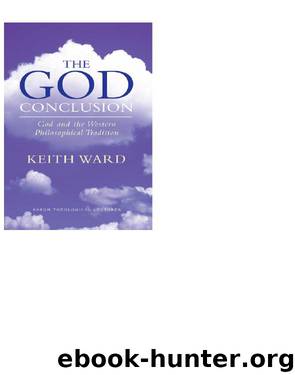The God Conclusion by Ward Keith

Author:Ward, Keith
Language: eng
Format: epub
Tags: religion, christian, spiritual, holy, god, prayer, faith, morals, ethics, jesus, bible, testament, theology, philosophy
ISBN: 9780232528169
Publisher: Andrews UK Limited
Published: 2010-04-04T04:00:00+00:00
Chapter 7
How Kant Did Not Undermine All Possible Arguments for God
Immanuel Kant is widely thought of as the philosopher who undermined the possibility of metaphysics, showed that morality is completely independent of religion, and destroyed all rational arguments for God. Yet in fact his aim in philosophy was to set metaphysics on a firm foundation. He suggested that moral obligations would be lacking in all reality, and be unable to motivate our conduct, ‘save on the assumption that there exists a supreme being’.1 And at the conclusion of his First Critique, he says, ‘Can we … assume a wise and omnipotent Author of the world? Undoubtedly we may; and we not only may, but must, do so.’2 That sounds very like an argument for believing in God.
Kant’s philosophy is peculiarly complex, but it is completely misunderstood if it is not seen as a defence of belief in one supreme spiritual reality as the ultimate cause of the world. One root of this misunderstanding is a failure to take to heart Kant’s distinction between theoretical (‘pure’) and practical reason.
Kant reports that he had been woken from his dogmatic slumbers by reading David Hume. This did not turn Kant into an Empiricist, but it did bring him to agree with Hume that ‘no objects can be represented through pure concepts of understanding, apart from the conditions of sensibility’.3 Theoretical knowledge requires both concepts and sense-experiences. Experiences without concepts give no knowledge. But concepts without experiences are ‘empty’, mere forms of thought without content.
It follows at once that the idea of God has no content, since Kant believed that no sensory experience or direct apprehension of God is possible. Therefore God cannot be an object of theoretical knowledge. But it does not follow that the idea of God is useless, arbitrary, or merely optional. The idea of God is in fact the supreme ideal of Reason, and the fully rational person has to postulate and assume it.
One way of putting this in a more contemporary fashion is to say that God will never be part of any natural science. God will never be an object studied by chemistry, physics, cosmology, or psychology, and will never be part of any scientific theory. But the idea of God may be a meta-scientific postulate that accounts for the unity and intelligibility of nature, and – even more importantly – that underlies a rational commitment to the pursuit of objective value in morality and aesthetics.
The trouble with such postulates, for Kant, is twofold. They can never be verified, and they often lead to Antinomies, the equal rationality of opposing hypotheses. It was the discovery of the Antinomies, the contradictions, of Reason that led to Kant’s Critical philosophy. He thought Reason could prove that time and space are bounded, and that they are infinite; that things are infinitely divisible, and that there must be some smallest indivisible elements (perhaps human selves); that the world is determined, and that the will is free; and that there is a necessary being (God), and that such a being is impossible.
Download
This site does not store any files on its server. We only index and link to content provided by other sites. Please contact the content providers to delete copyright contents if any and email us, we'll remove relevant links or contents immediately.
Never by Ken Follett(2865)
The Man Who Died Twice by Richard Osman(2287)
Machine Learning at Scale with H2O by Gregory Keys | David Whiting(2252)
Fairy Tale by Stephen King(2056)
Will by Will Smith(2023)
Reminders of Him: A Novel by Colleen Hoover(1866)
The Dawn of Everything: A New History of Humanity by David Graeber & David Wengrow(1561)
The Stranger in the Lifeboat by Mitch Albom(1522)
The Becoming by Nora Roberts(1320)
Friends, Lovers, and the Big Terrible Thing by Matthew Perry(1314)
A Short History of War by Jeremy Black(1294)
New Morning Mercies: A Daily Gospel Devotional by Paul David Tripp(1292)
HBR's 10 Must Reads 2022 by Harvard Business Review(1249)
The Strength In Our Scars by Bianca Sparacino(1232)
Go Tell the Bees That I Am Gone by Diana Gabaldon(1230)
The Fall of Babel by Josiah Bancroft(1229)
Can't Hurt Me: Master Your Mind and Defy the Odds - Clean Edition by David Goggins(1215)
515945210 by Unknown(1205)
Love on the Brain by Ali Hazelwood(1082)
